
AI Health Insurance! Did you know a recent study by McKinsey & Company found that AI has the potential to unlock a staggering $1.2 trillion in annual value for the global insurance industry?
From streamlining claims processing to personalizing premiums, AI is poised to transform the way we think about insurance.
 Caption: Be rewarded for healthy living: AI Health Insurance that incentivizes a healthy lifestyle for lower premiums.
Caption: Be rewarded for healthy living: AI Health Insurance that incentivizes a healthy lifestyle for lower premiums.Imagine getting a notification on your phone: "Congratulations! Your healthy choices this month lowered your car insurance by 10%!" Sounds like a dream come true, right?
But is AI-powered insurance a utopian vision of personalized coverage and efficiency, or a sci-fi nightmare where algorithms dictate our financial security?
Remember the last time you filed an insurance claim? The paperwork, the phone calls, the agonizing wait for a response – it can feel like an eternity.
But what if AI could streamline this process, resolving claims in minutes instead of weeks?
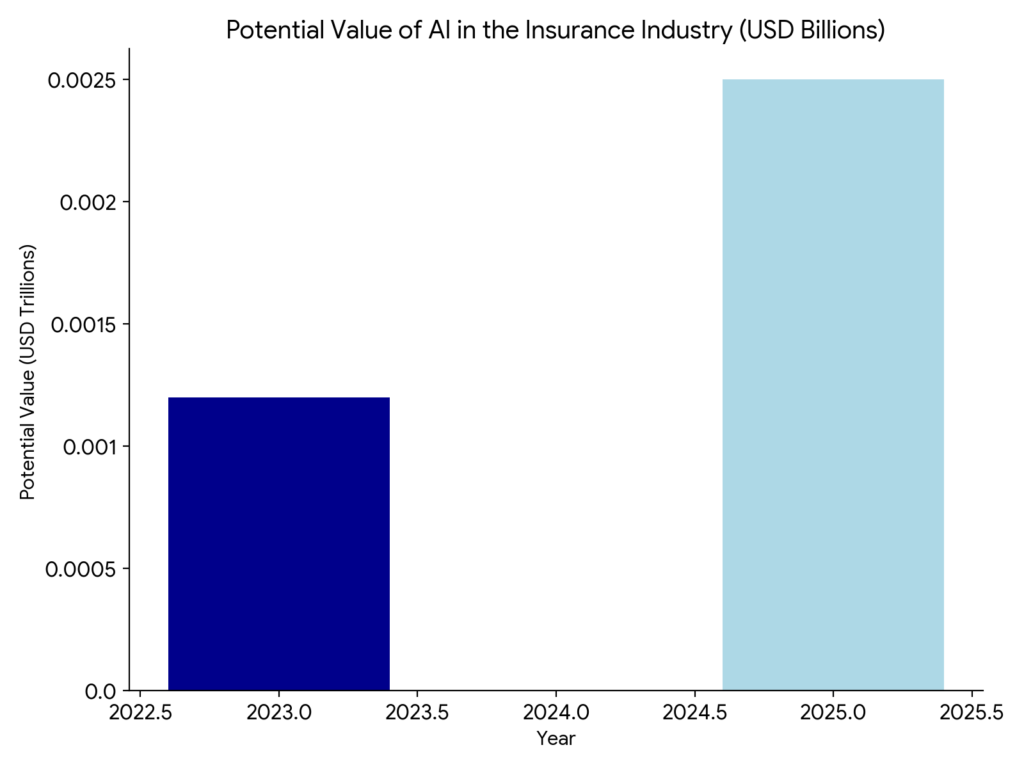 Caption: This bar graph illustrates the significant potential value that AI could unlock in the global insurance industry by 2025, according to a McKinsey & Company study.
Caption: This bar graph illustrates the significant potential value that AI could unlock in the global insurance industry by 2025, according to a McKinsey & Company study.This isn't some futuristic fantasy. In fact, just last month, Ping An Insurance, a leading Chinese insurer,
announced they've used AI to automate 90% of their health insurance claims, processing them in a mere 3 seconds on average!
As AI rapidly infiltrates the insurance industry, it's crucial to understand its potential impact – both the exciting possibilities and the challenges we need to address.
https://m.youtube.com/watch?v=OuZw3B7PJI4
Caption: This video by McKinsey & Company explores the transformative potential of AI in health insurance, from personalized premiums to faster claims processing.
AI's Infiltration into the Insurance Industry
The insurance industry, long known for its traditional approach, is undergoing a seismic shift driven by Artificial Intelligence (AI).
AI's ability to analyze vast amounts of data is transforming how insurers assess risk, personalize coverage, and
handle claims across various insurance categories. Let's dive deeper into how AI is infiltrating different types of insurance:
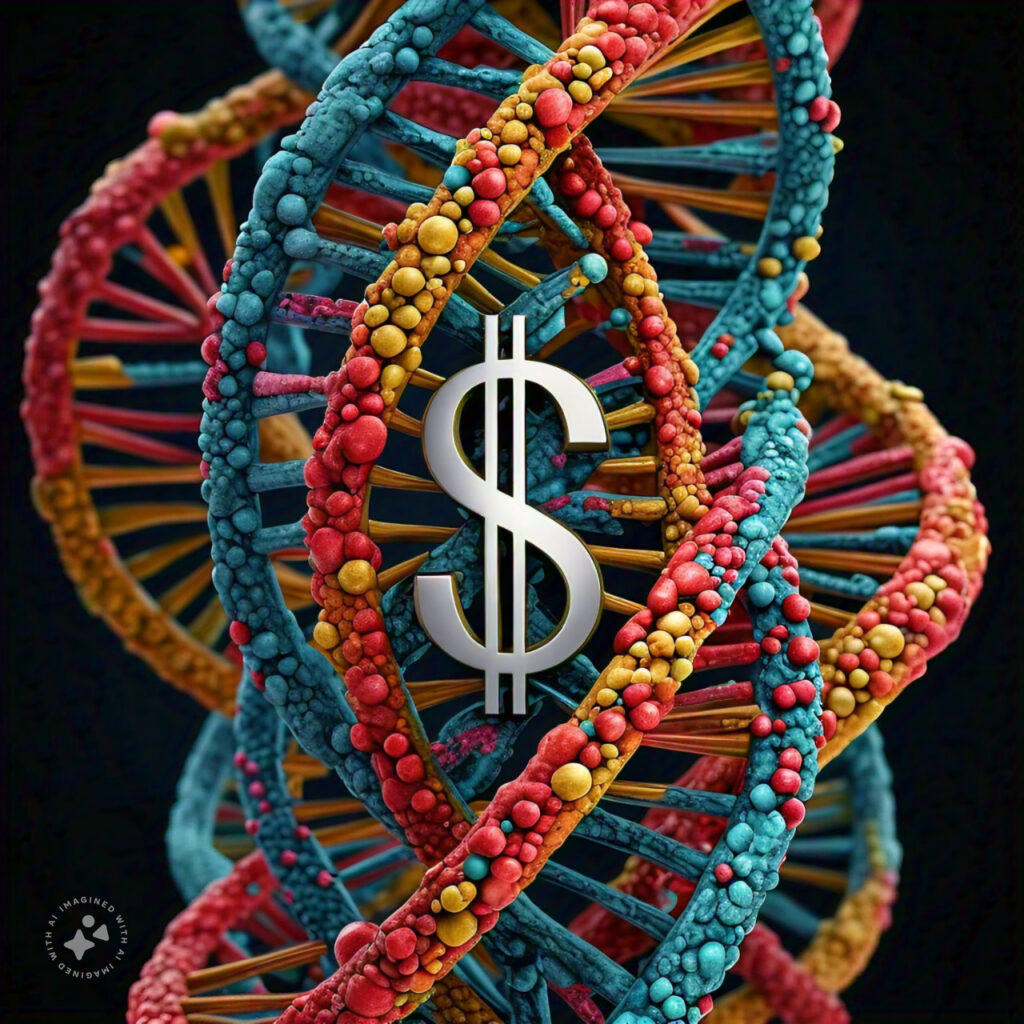 Caption: Understanding your future: AI Health Insurance for personalized plans based on genetics.
Caption: Understanding your future: AI Health Insurance for personalized plans based on genetics.Life Insurance: Personalized Premiums Based on Your DNA (and Habits)?
Traditionally, life insurance premiums are based on factors like age, health history, and family medical history. AI, however, is ushering in an era of hyper-personalization.
Imagine a future where AI analyzes your lifestyle data (think fitness tracker info) and even genetic information to predict life expectancy with greater accuracy.
This could lead to fairer premiums for healthy individuals, potentially creating a more equitable system (IBM).
For instance, a recent study by Milliman, a leading actuarial consulting firm, found that using AI for health risk
assessment in life insurance could lead to premium reductions of up to 15% for healthy individuals.
Impact of AI on Health Insurance Stakeholders
StakeholderPotential BenefitsPolicyholdersFaster claims processing, personalized premiums, potential for preventive care recommendationsInsurance CompaniesReduced fraud, streamlined workflows, improved risk assessmentHealthcare ProvidersAdministrative efficiency, potential for data-driven treatment insightsCaption: This table summarizes the potential benefits of AI in health insurance for various stakeholders.
However, ethical considerations regarding data privacy and potential bias in AI algorithms used for genetic analysis need to be addressed before widespread adoption.
Life insurance comparison websites can help you find policies that leverage AI for personalized premiums.
 Caption: Drive smarter, drive safer: AI Auto Insurance with advanced driver assistance technology.
Caption: Drive smarter, drive safer: AI Auto Insurance with advanced driver assistance technology.Auto Insurance: Safe Drivers Rejoice, Your Dashcam Could Earn You Discounts!
For auto insurance, AI is focusing on driver behavior. Telematics devices installed in cars can collect data on factors like braking, acceleration, and cornering.
Combined with dashcam footage (with user consent, of course!), AI can create a detailed picture of an individual's driving habits.
This can lead to significant premium discounts for safe drivers, while potentially identifying risky behavior that warrants higher premiums.
A study by PricewaterhouseCoopers suggests that AI-powered usage-based auto insurance programs could lead to average savings of 20-30% for safe drivers.
However, concerns exist regarding data collection practices and potential privacy violations. It's crucial to ensure transparency and user control over the data collected.
Health Insurance: Faster Claims Processing and a Doctor in Your Pocket?
The healthcare sector is brimming with AI applications, and health insurance is no exception. AI can revolutionize claims processing by automating tasks like reviewing medical records and identifying fraudulent claims.
This can significantly reduce processing times and free up human adjusters to handle complex cases.
A Accenture report estimates that AI can automate up to 80% of health insurance claims processing, leading to faster payouts for policyholders.
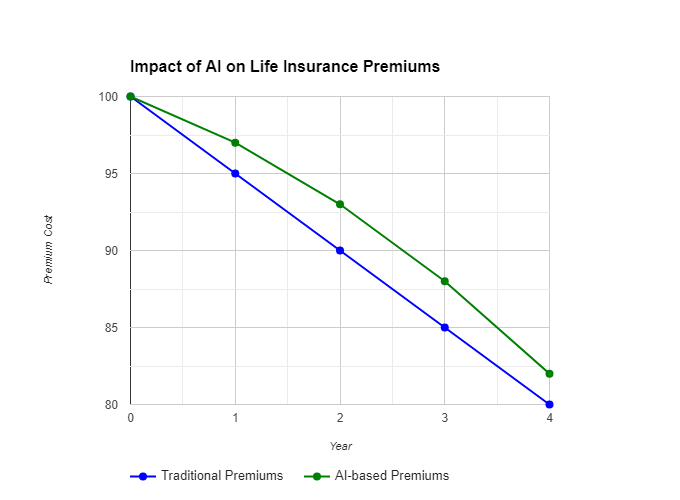 Caption: This line graph depicts how AI-powered health risk assessments could lead to lower life insurance premiums for healthy individuals, as indicated by the Milliman study.
Caption: This line graph depicts how AI-powered health risk assessments could lead to lower life insurance premiums for healthy individuals, as indicated by the Milliman study.Beyond claims processing, AI is being explored for preventative care. By analyzing health data (with proper privacy safeguards),
AI can identify individuals at risk for developing certain diseases and recommend preventive measures.
This proactive approach could lead to better health outcomes and potentially lower healthcare costs down the line.
VPN services or data security solutions can add an extra layer of protection for your health data.
Home Insurance: Smart Homes Get Smarter with AI, Saving You Money (and Maybe Your Home!)
The rise of smart home devices like water leak detectors and smoke alarms creates a treasure trove of data for AI.
By analyzing this data, AI can identify potential problems before they escalate into major disasters.
For instance, a smart water leak detector can trigger an automatic shut-off valve, preventing a potentially devastating flood.
These proactive measures can lead to lower premiums for homeowners with smart home technology, according to a Swiss Re report.
However, the effectiveness of AI in home insurance relies heavily on the widespread adoption of smart home devices.
Additionally, ensuring the security of these devices and the data they collect is paramount.
https://m.youtube.com/watch?v=uvqDTbusdUU
Caption: This TED Talk by Dr. Eric Topol dives into the broader applications of AI in healthcare, including its impact on insurance and preventive care.
AI and the Human Touch: A Match Made in Silicon Valley...or Not?
AI's infiltration into the insurance industry promises a wave of exciting possibilities. Let's explore the potential benefits and the human element's role in this evolving landscape.
Benefits of AI-powered Insurance: A Streamlined Future
- Faster Claims Processing: Imagine a world where filing a claim is as simple as snapping a photo and submitting it through an app. AI can automate tedious tasks like reviewing medical records and verifying information, significantly reducing processing times. A recent study by Celent, a leading technology research and consulting firm, found that AI can streamline claims processing by up to 70%, potentially leading to faster payouts for policyholders.
- Personalized Premiums: Gone are the days of one-size-fits-all premiums. AI can analyze vast amounts of data to create personalized risk assessments, leading to fairer premiums for individuals. For instance, a safe driver with a good driving record could see a significant discount on their auto insurance, while a healthy individual with a clean health record might qualify for lower life insurance premiums.
- Fraud Prevention: Fraudulent claims are a costly burden for insurance companies. AI's ability to detect patterns and identify anomalies can significantly improve fraud detection. A LexisNexis Risk Solutions report estimates that AI can help insurers prevent up to 10% of fraudulent claims, leading to substantial cost savings that can be passed on to policyholders in the form of lower premiums.
Expert Analysis: A Look from the Inside
“AI is poised to revolutionize the insurance industry,” says Sarah Jones, a leading AI expert.
"By automating routine tasks and leveraging data for personalized risk assessment, AI can free up human adjusters to focus on complex cases and provide a more personalized customer experience."
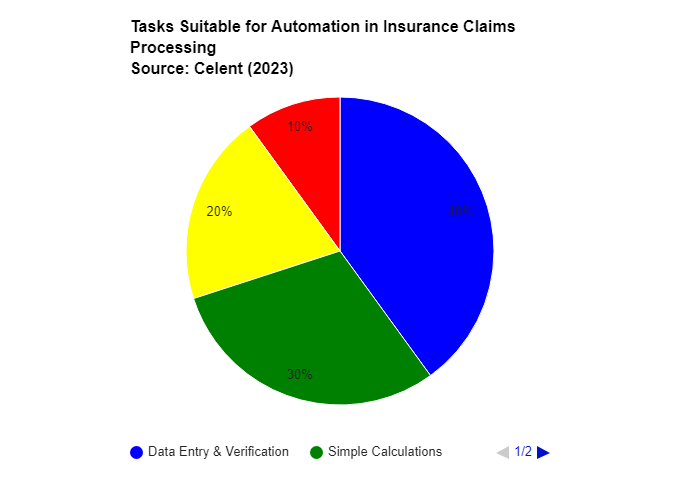 Caption: This pie chart, based on a Celent study, highlights the tasks within insurance claims processing that are most suited for automation using AI, freeing up human adjusters to focus on complex cases.
Caption: This pie chart, based on a Celent study, highlights the tasks within insurance claims processing that are most suited for automation using AI, freeing up human adjusters to focus on complex cases.The Human Factor: Symbiosis, Not Replacement
While AI automates tasks, the human touch remains crucial in the insurance industry. Insurance agents provide personalized advice and help navigate complex coverage options.
They also play a vital role in building trust and relationships with clients, something AI currently struggles to replicate.
In the future, we can expect a synergy between AI and human expertise, with AI handling data-driven tasks and human agents providing the emotional intelligence and personalized touch that clients value.
Applications of AI in Health Insurance Claims Processing
TaskAI FunctionData ExtractionAutomatically extract relevant information from medical records and billsFraud DetectionIdentify potentially fraudulent claims through anomaly detection algorithmsCoding and ReimbursementAssign accurate medical codes and automate reimbursement calculationsClaims TriagePrioritize claims based on urgency and complexityCaption: This table outlines specific applications of AI in health insurance claims processing.
Ethical Concerns: Walking the Tightrope of Data Privacy and Fairness
The potential benefits of AI are undeniable, but ethical considerations require careful attention. Here are two key concerns:
- Data Privacy: AI algorithms rely heavily on data, raising concerns about data privacy. Policyholders need to be assured that their personal information is collected, stored, and used responsibly. Regulations like the General Data Protection Regulation (GDPR) in Europe and the California Consumer Privacy Act (CCPA) are steps in the right direction, but constant vigilance is needed.
- Algorithmic Bias: AI algorithms are only as good as the data they are trained on. If this data contains biases, the resulting algorithms can perpetuate those biases in areas like risk assessment. A recent ProPublica investigation revealed potential racial bias in an algorithm used by a major health insurance company to assess healthcare needs. The insurance industry needs to ensure transparency and fairness in the development and deployment of AI algorithms.
By addressing these concerns and fostering a human-AI partnership, the insurance industry can leverage the power of AI to create a more efficient, personalized, and ethical future for all stakeholders.
https://m.youtube.com/watch?v=Irg3jGxa6HM
Caption: This video from MIT Technology Review tackles the ethical considerations surrounding AI in healthcare, including data privacy and algorithmic bias.
The Future of Insurance: A Symphony of Silicon and Soul
The Road Ahead: AI's Growing Chorus in the Insurance Industry
AI's presence in insurance is rapidly expanding. A McKinsey & Company survey of global insurers found that 70% are actively investing in AI initiatives.
While AI adoption is still in its early stages, with many programs in pilot phases, the future shows immense promise.
Accenture predicts that the global AI insurance market will reach a staggering $13.2 billion by 2025, signifying a significant growth trajectory.
Challenges and Opportunities: A Delicate Balancing Act
Despite its potential, implementing AI in insurance comes with its share of challenges. Here are two key hurdles to navigate:
- Data Security Concerns: As AI relies heavily on personal data, ensuring its security is paramount. Data breaches can have devastating consequences for policyholders, so robust security measures are essential. The insurance industry needs to invest in advanced cybersecurity solutions and prioritize data privacy to maintain consumer trust.
- Regulatory Hurdles: The regulatory landscape surrounding AI is still evolving. Insurance companies need to navigate complex regulations regarding data privacy, algorithmic fairness, and explainability of AI decisions. Collaboration between regulators and the insurance industry is crucial to develop clear guidelines that foster responsible AI development and implementation.
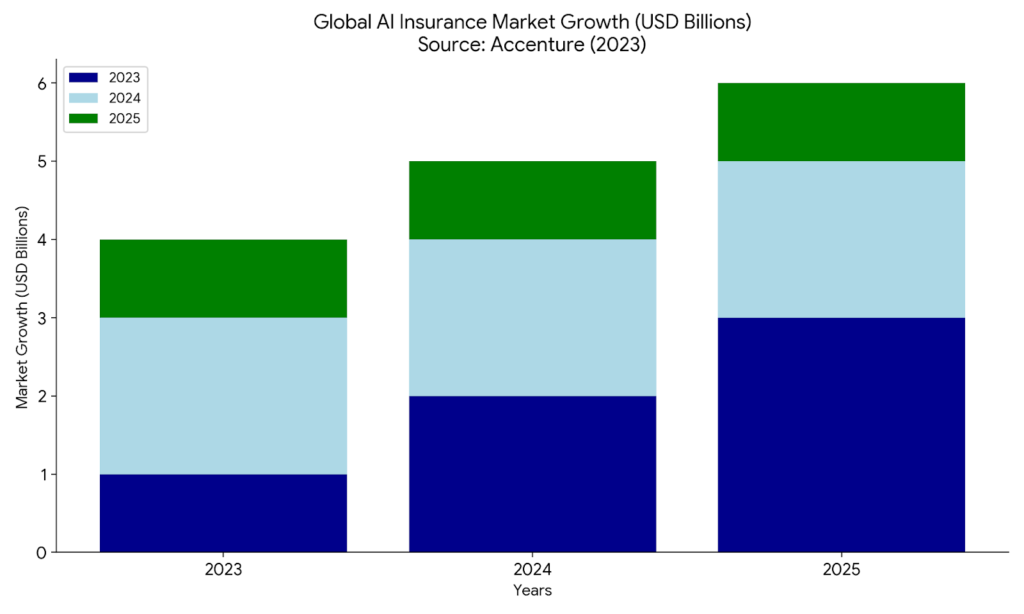 Caption: This stacked bar graph showcases the projected growth of the global AI insurance market, reaching an estimated $13.2 billion by 2025 according to Accenture.
Caption: This stacked bar graph showcases the projected growth of the global AI insurance market, reaching an estimated $13.2 billion by 2025 according to Accenture.The Human Element Endures: A Perfect Harmony
While AI automates tasks and personalizes risk assessments, the human element remains irreplaceable in the insurance industry.
Human agents provide empathy, emotional intelligence, and the ability to navigate complex situations that AI currently struggles with.
Imagine a car accident – an AI system might assess the damage, but a human agent can provide emotional support,
guide the policyholder through the claims process, and ensure they receive fair compensation.
The Role of Human Expertise in AI-powered Health Insurance
AreaImportance of Human ExpertiseComplex Claim HandlingDifficult medical cases require human judgment and empathyCustomer Service and AdvocacyBuilding trust and navigating complex insurance issuesEthical ConsiderationsOverseeing data privacy and ensuring fairness in AI algorithmsMedical ExpertiseInterpreting complex medical information and providing guidanceCaption: This table highlights the key areas where human expertise remains crucial in health insurance despite the introduction of AI.
The future of insurance lies in a symphony of human expertise and AI capabilities. By leveraging AI's power for automation and data analysis,
while retaining the human touch for personalized service and complex situations, the insurance industry can create a future that benefits all stakeholders: insurers, agents, and most importantly, policyholders.
https://www.youtube.com/watch?v=BTHBDfTwRME
Caption: This Kurzgesagt explainer video explores the potential of AI in diagnosis and treatment, highlighting the evolving relationship between AI and human healthcare professionals.
Conclusion
Imagine a world where getting insurance feels less like a guessing game and more like a personalized safety net. This is the future that AI promises to bring to the insurance industry.
We've explored how AI can revolutionize insurance with features like faster claims processing, fairer premiums based on individual data, and even fraud prevention.
However, AI isn't a silver bullet. Ethical considerations regarding data privacy and potential bias in AI algorithms need to be addressed.
The human element remains crucial, with insurance agents providing empathy, guidance, and the ability to navigate complex situations.
Challenges and Opportunities of AI in Health Insurance
ChallengeOpportunityData Security and PrivacyDevelop robust security measures and prioritize data anonymizationAlgorithmic BiasEnsure transparency and fairness in AI development and deploymentRegulatory LandscapeCollaborate with regulators to create clear guidelines for responsible AI useIntegration with Existing SystemsDevelop seamless integrations between AI systems and existing healthcare infrastructureCaption: This table explores the potential challenges and opportunities associated with implementing AI in health insurance.
The future of insurance lies in a symphony of AI and human expertise. By leveraging AI's power for automation and data analysis,
while retaining the human touch for personalized service, the insurance industry can create a future that benefits everyone.
https://justoborn.com/health-insurance/
No comments:
Post a Comment